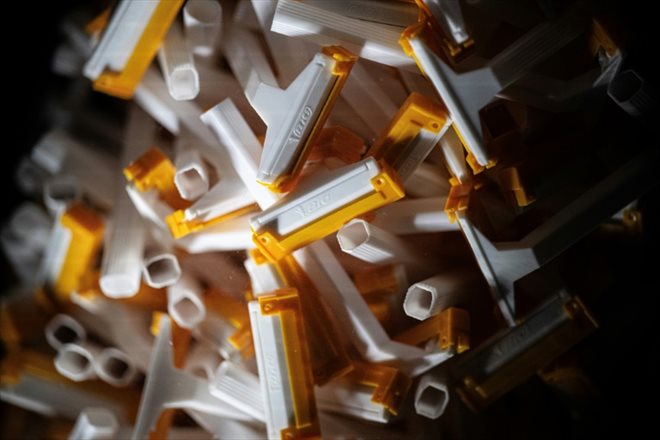Bic razors packaged at the Longueil-Sainte-Marie production factory, October 19, 2023 in Oise (AFP/JULIEN DE ROSA)
Recycled plastic in the razor: the Bic group, manufacturer of disposable pens, razors and lighters, is timidly trying to correct its image as the embodiment of resource-unconscious consumption.
Two piles of razor handles are placed side by side and nothing distinguishes them, apart from the shade of orange, a little less clear for the one on the left. And for good reason, it contains recycled polystyrene, from refrigerators.
“The color will not be the same, but for the consumer, it will be a product that will remain satisfactory,” said Thursday Sophie Legrand, director of the Bic factory in Longueil-Sainte-Marie (Oise), where 200 employees produce 2 daily .8 million razors.
The Bic group, the world number one in lighters and number two in pens, has set itself the objective of incorporating 20% recycled plastic into all of its products by 2025, and 50% by 2030.

An employee checks the quality of Bic razors on a production line at the Longueil-Sainte-Marie factory, October 19, 2023 in Oise (AFP/JULIEN DE ROSA)
For razors, the industrial process is in the testing phase with production starting in 2024.
“Making a razor without any plastic, today, we do not have the solution,” says Ms. Legrand, referring to the additional cost that a razor with a wooden handle would represent, while the factory exports 90% of its consumption, towards Europe, but also “in Africa, in the Middle East, which are very sensitive to price”.
The Longueil-Sainte-Marie factory celebrated its 50th anniversary on Thursday, in front of senior managers of the group and a few visitors, who were able to observe the twelve successive stages to manufacture the 7 to 8 million blades produced each day, from coils of “strip”, 50 kilos of rolled steel, which will yield around 200,000 blades each.

An employee prepares the metal which will be used to manufacture Bic razor blades at the Longueil-Sainte-Marie factory, October 19, 2023 in Oise (AFP/JULIEN DE ROSA)
Sharpening, cutting, chemical treatment, with chrome deposits to improve the strength of the blade, then Teflon to improve its glide: in a jar, the inspectors carefully inspect all the blades, in batches of 1,200, threaded into a bayonet, using on the lookout for defects which would make them unsuitable for marketing.
“We are investing a lot to increase productivity and integrate new technologies. Between 2022 and 2024, we have around 4 million euros of investments in the factory,” explains Ms. Legrand.
– The availability of recycled plastic –
The incorporation of recycled material does not require investment strictly speaking. The machines are the same, only the industrial processes need to be adjusted, according to the group.

An employee checks the quality of Bic razor blades at the Longueil-Sainte-Marie production factory, October 19, 2023 in Oise (AFP/JULIEN DE ROSA)
“The whole problem is having the sufficient quantity of recycled material available on the market, since it is not just Bic that is committed to sustainable development, all companies do it,” assures the manager, which indicates that the group is in discussions to enter into a contract with a supplier, whose name it is withholding at this stage.
When we talk about the fact that, even when made from recycled plastic, the products will remain disposable, the embarrassment is palpable.

Bic razor blades at the Longueil-Sainte-Marie production factory, October 19, 2023 in Oise (AFP/JULIEN DE ROSA)
“These are not single-use razors,” retorts Ms. Legrand: some consumers can “use the same razor for several months.” She emphasizes that the group, alongside one-piece razors, also produces rechargeable razors.
For Charlotte Soulary, advocacy manager for Zero Waste France, this “remains a short-use product”: “the disposable razor is not a product that makes sense from an environmental point of view, even if we try to modify it marginally,” she judges.

A sample of the new recycled plastic used to produce Bic razors at the Longueil-Sainte-Marie production plant, October 19, 2023 in Oise (AFP/JULIEN DE ROSA)
Overall, the vast majority of Bic’s greenhouse gas emissions are indirect, linked in particular to its supplies of raw materials including plastic; these indirect emissions should only drop by 5% by 2030, compared to 2019, according to the group’s plan.
According to the NGO, the purchase price should include “the environmental cost” of the product. If taxation evolves in this direction, “it will inevitably have effects on the market,” she emphasizes.

BIC razors on a production line in Longueil Sainte Marie, October 19, 2023 north of Paris (AFP/JULIEN DE ROSA)
Because for the moment, even in Europe, among the most ambitious regions in terms of sustainable development, the orange and white razor, also known for its affordable price, is a hit, driven by the inflationary context.
“We are at +20% in Europe in turnover, we are gaining market share in 19 out of 20 countries, this is often the case in a difficult economic context”, indicates Henri Nicolau, general manager of Bic for France.
© 2023 AFP
Did you like this article ? Share it with your friends using the buttons below.




